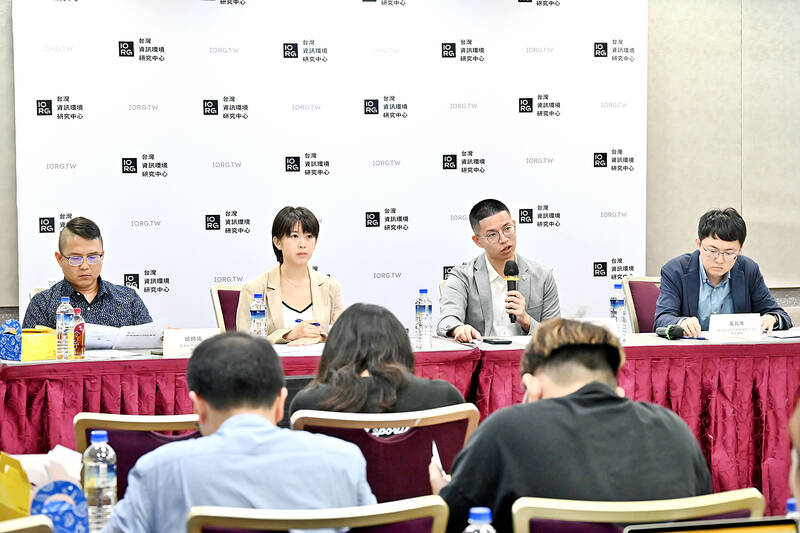More than half of “US skepticism” narratives were created by Taiwan actors, while People’s Republic of China (PRC) actors had strong inclinations to spread such messages, the Information Operations Research Group (IORG) told a news conference yesterday.
The IORG, a civilian research organization working to bolster information literacy and counter authoritarianism, invited experts on cross-strait issues and US-Taiwan relations to share their insights on a report it published last month entitled US Skepticism Narratives and Where They Come From.
Growing ties between the US and Taiwan have fostered skepticism toward the US, which was manifested in “unreasonable or manipulative narratives that suggest that Taiwan should keep a distance from or reduce its relations with the US,” the report said.

Photo: George Tsorng, Taipei Times
In the report, author and IORG codirector Yu Chih-hao (游知澔) analyzed 84 US skepticism narratives over the past three years.
“Collectively, these 84 narratives present an escalation in the harmfulness of both US actions towards Taiwan and its end goal for Taiwan,” he said.
The narratives shifted from an exchange of benefits that ignored Taiwan’s interests in 2021, to a supposed US plan to destroy Taiwan altogether in these two years, he said.
Actors controlled by PRC authorities and media or affiliated organizations were found to be involved in amplifying 70 out of 84 narratives in the report, showing that these actors were more likely to spread US skepticism narratives rather than creating new ones, the report said.
Among the 84 narratives analyzed, 44 were created by Taiwanese actors, indicating “existing collective psychology in Taiwanese society” and explaining their continued circulation, it said.
For example, statements that accused the US of colluding with Taiwanese elites and exploiting Taiwanese reflect partisan polarization in Taiwan, while those that portrayed the US as “the source of chaos and war in the world” reflected war anxiety, it said.
As other PRC propaganda, these narratives shaped China as “a superior alternative” to the US, which is a worldview that might be appealing to some, who could in turn be vulnerable to information manipulation conducted by Beijing to sway elections, Yu said.
Huang Jaw-nian (黃兆年), an assistant professor at National Chengchi University’s Graduate Institute of Development Studies, said that authoritarian regimes tend to create a positive image of themselves by painting competitors negatively.
These regimes use conflicting opinions in democracies to their advantage, he said.
Taiwanese should equip themselves with sharpened media literacy and “literacy on global geopolitics” to form judgements on Taiwan’s relations with the US and China based on factual evidence, he said.
Jasmine Lee (李可心), coeditor of US Taiwan Watch, said that a history of severing diplomatic ties might be the reason Taiwanese are anxious about the nation’s relations with the US.
The two countries share the “double guarantees” of shared strategic goals and democratic values, she said.
Asked about the influence of US skepticism narratives on the presidential election in January next year, Albert Shihyi Chiu (邱師儀), an associate professor at Tunghai University’s Department of Political Science, said that China skepticism greatly outnumbers US skepticism, so it would be difficult for China-leaning stances to win votes.
To combat US skepticism narratives, it is crucial to have “diverse alternatives,” including responses from the US, Huang said.

The Mainland Affairs Council (MAC) today condemned the Chinese Communist Party (CCP) after the Czech officials confirmed that Chinese agents had surveilled Vice President Hsiao Bi-khim (蕭美琴) during her visit to Prague in March last year. Czech Military Intelligence director Petr Bartovsky yesterday said that Chinese operatives had attempted to create the conditions to carry out a demonstrative incident involving Hsiao, going as far as to plan a collision with her car. Hsiao was vice president-elect at the time. The MAC said that it has requested an explanation and demanded a public apology from Beijing. The CCP has repeatedly ignored the desires

Many Chinese spouses required to submit proof of having renounced their Chinese household registration have either completed the process or provided affidavits ahead of the June 30 deadline, the Mainland Affairs Council (MAC) said on Thursday. Of the 12,146 people required to submit the proof, 5,534 had done so as of Wednesday, MAC deputy head and spokesperson Liang Wen-chieh (梁文傑) said. Another 2,572 people who met conditions for exemption or deferral from submitting proof of deregistration — such as those with serious illnesses or injuries — have submitted affidavits instead, he said. “As long as individuals are willing to cooperate with the legal

The Ma-anshan Nuclear Power Plant’s license has expired and it cannot simply be restarted, the Executive Yuan said today, ahead of national debates on the nuclear power referendum. The No. 2 reactor at the Ma-anshan Nuclear Power Plant in Pingtung County was disconnected from the nation’s power grid and completely shut down on May 17, the day its license expired. The government would prioritize people’s safety and conduct necessary evaluations and checks if there is a need to extend the service life of the reactor, Executive Yuan spokeswoman Michelle Lee (李慧芝) told a news conference. Lee said that the referendum would read: “Do

Taiwan's Vice President Hsiao Bi-khim (蕭美琴) said Saturday that she would not be intimidated by the Chinese Communist Party (CCP), following reports that Chinese agents planned to ram her car during a visit to the Czech Republic last year. "I had a great visit to Prague & thank the Czech authorities for their hospitality & ensuring my safety," Hsiao said on social media platform X. "The CCP's unlawful activities will NOT intimidate me from voicing Taiwan's interests in the international community," she wrote. Hsiao visited the Czech Republic on March 18 last year as vice president-elect and met with Czech Senate leadership, including